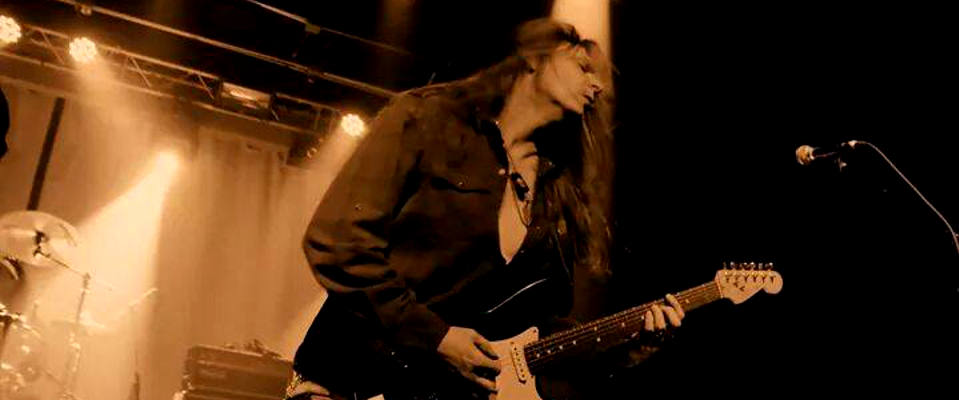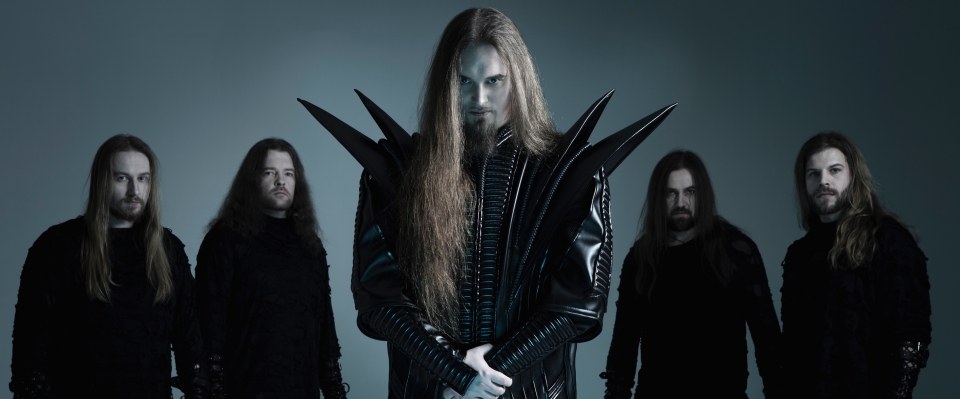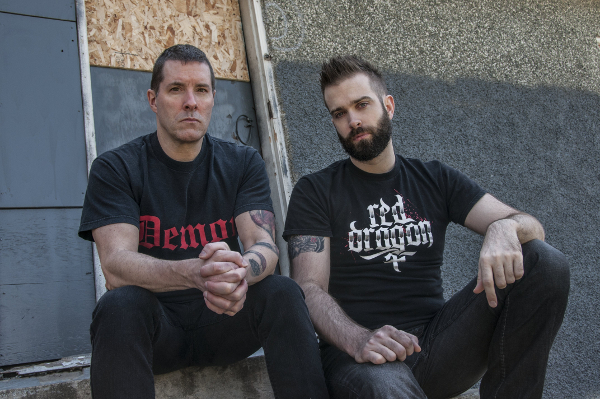
by Alissa Ordabai
– Senior Columnist —
Cutting-edge genres tend to freeze into a formula faster than you can say “kill em’ all.” It takes a special kind of touch to stick to your chosen style for decades without making it stale. Jeff Waters has always been among the rare few who could continually pull it off. Thirty years on after his band Annihilator received its first acclaim as a new exciting metal outfit, the Canadian veterans keep releasing records. And the output remains as convincing as in the early days when Annihilator used to share a tour bus with another fledgling whose name at the time was Diamond Darrell. Coming from completely different backgrounds, Waters and the Pantera guitarist have nevertheless instantly hit it off back in 1991 while supporting Judas Priest on the Painkiller tour. Both guitarists’ admiration of Eddie Van Halen became their main connecting point, but each took their hero’s legacy into his own direction.
Not just another young high-tech metal axeman resonating with the spirit of the early Eighties, Waters – apart from being a shredder par excellence – never shied away from including diverse vibes into his music. He could be a brazen, dazzling thrash player, but also exquisitely cryptic when he’d switch to acoustic guitar and weave his virtuosic allusions to Spain and to the mathematical rigor of the baroque. This not only diversified the sound of his band, but also opened a window into a bigger world for many metal fans of the day. If anything, Waters proved that for a fuller life all genres – including thrash – must keep their oxygen-giving connection to wider culture.
These days music remains an exciting game to Waters, and his thrash sounds like a developing art form, not a dead set of rules or a sectarian pursuit. The biggest-selling metal act in Canada, with nearly two million albums sold worldwide, Annihilator is unlikely to run out of steam just yet. Their new album Feast due to come out in August still has all the things that made them one of the most accomplished bands in the history of the genre. Sharp, vigorous songwriting, Dave Padden’s vividly intense vocals, and, of course, Waters’ solos – tight, flawlessly proportionate locomotion of blazing runs, flashing cascades of arpeggios, and a sense of form shaped by the perfect balance of groove and melody.
Waters claims provocatively that he’s “learnt nothing new for the past 15 years,” but his intuition and knowledge ensure things don’t get hackneyed on the new record. His methods may have been tried and tested time and time again, but unexpected melodies unfolding against the background of pumping riffs and barnburner grooves keep you guessing what’s coming next, bar after bar. Annihilator still has things to say without resorting to superficial dalliances with flash-in-the-pan trends or flogging old stereotypes to death. The purpose of playing thrash becomes instantly obvious when you listen to this record – to show the world that you are full of strength, talent, and that life is as exciting in 2013 as it was in 1983.
Hardrock Haven caught up with Waters earlier this week in London – one of the many stopovers of his current press tour. The initially allocated 15 minutes grew into a half-hour interview where Waters talked about the new album, all things guitar, his memories of the early days, and his view on the current state of the music industry. He also shared a mind-boggling songwriting secret which helps him sound so unpredictable. This writer has never heard of anyone using this sort of songwriting approach before. But neither has she met such a charming young woman as Waters’ fiancé who accompanies him on this trip and whose conversation made this writer’s waiting time before the interview a cool, fun diversion. And when Waters appeared to sit down and talk – smiling, toned, and upbeat – it became apparent that he finds himself at a good place right now, in harmony between himself and the life he leads.
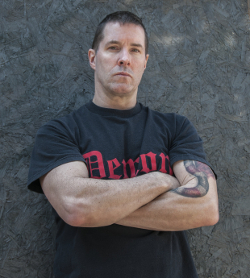 Alissa Ordabai: Congratulations on the new album, Jeff.
Alissa Ordabai: Congratulations on the new album, Jeff.
Jeff Waters: Another one. [Smiles.] It’s the song titles. [Points at the sheet of paper with the track list for the new album.] I came over here from South America, we didn’t sleep, just did our laundry, came over, and I realised, “Oh my god, I’m doing a press trip! And I can’t remember the songs!” You know what I mean? You work so hard on this, and it was done so long ago that you don’t listen to it when you’ve finished it. Six months of hard work and that’s it, I want to forget about it! And then three months later you are on a press trip and I was like, “Oh my god, we’d better get to the hotel and I’d better start listening to these things.” Remember what the lyrics are and print out the lyric sheets, get familiar with them again.
AO: Has enough time passed for you to start looking objectively on this record or are still very much attached to it?
JW: That’s one thing I think I’m good at – and I think a lot of musicians are not good at – it’s when I do a record, I am quite positive that we all feel that sometimes it’s the greatest thing we’ve done, and we’re stepping it up one, and all that. But I always feel that way because when you create something you are like, “Wow, it’s my baby!” But then I really try to get away from it for a while and then look back on it when it’s way too late, when the press, the fans, the label, everybody’s got it, and they already have their opinions, and they are usually pretty accurate. Generally all of them together are pretty accurate. I look back and I go, “Damn, that album had like two or three really killer songs!” And then there would be three or four pretty good songs, and then two or three where I go, “Oh, Jesus! I wish I could go back and review it!” But you don’t know when it’s happening. Like right now I saw this list, an hour ago, and realised that the last three songs on the album – and it’s not intentional, it just worked out this way – I would call, “Oh gee, I wish I could go back and put some stronger stuff on!”
And I actually like the first six, and I haven’t felt that way since 1994 with King of the Kill. And I was actually right because the press, the fans, and the label said the same thing. So I must be right that more than half of the record was really, really strong. And before that I had my first two albums that were the biggest sellers. It was the same thing – almost all of the songs were considered really good songs by the fans, the press, and the label. I kind of trust that, but it’s way too late. When you are doing this stuff, you can’t exactly invite the press and everybody to listen in as you are writing. So I guess based on everything I’ve been through, I think I’ve got a really good record this time. Not that I didn’t before, but this is a special one because I feel that the first six are really strong and I haven’t felt that way in a long time.
AO: Was there an initial concept behind this record or did it all fall together as you went along?
JW: No. There never really is. The way I write is that during the year I’ll maybe get a little bit of time on the bus or usually in the studio when there is nothing going on and I’m on a break or between tours. I’ll go down to my studio which is kind of handy to have a recording studio, and write a drum beat that I like, a funky little thing. I’ll take a Slayer- or a Testament-type beat, or an AC / DC beat, anything that I like that would groove, or thrash. I’ll listen to it for a while and just turn it up loud and I’ll just jam to that drum beat. And record it. And that’s it. And then sometimes I’ll go back to it and write five more. Or over the month I’ll write six more, or whatever. And at the end of the couple of years when it’s time to write another record, you hopefully have a library or a catalogue of like 100 or 150 riffs.
Then what I do almost every time is I invite two or three of my friends over from different backgrounds, and one is a metal musician, and one is just a fan, and one doesn’t even like this stuff. And I get them whenever they can to come over and listen to all the riffs, and say, “Three categories: ‘Don’t like it,’ ‘That’s OK,’ and ‘Oh, that’s great!’” Let them pick them. And the ones they don’t like I just delete, unless I really like it. And at the end when it’s time to write a record, I sit down and I’ve got all these riffs written, say, 60. And I put them in folders in my computer: “This is a verse kind of riff, this is the chorus, this is the solo, this is the intro.” That’s how I start writing an album. I look in those folders and I pick the first riff that I like, and it’s cut and paste. I take a chorus from that folder and I put it alongside the verse. And if they flow together, there you go. And if it doesn’t flow, I keep dropping in another chorus until they fit. And if they don’t fit and nothing fits, I actually write something to it. But 95 per cent of the time I know the riffs are good because everybody’s said they are good and I agree with them. So I’ve got the guts for the record done before I even start. And then it’s just the matter of building on it and adding things – the bass, and fixing the drums to a different beat, and all that.
And once the music is finished and I’ve demoed the music, then is when I start getting the feel for what it sounds like and what it reminds me of, and start writing lyrics to it. Or my singer Dave does. So it’s a very weird way of writing. But it actually works good because sometimes you sit there and you just write a riff, and maybe it’s technical, and then the next one you write that’s good would be simple. And you chain them together, and if they fit – if they fit weird or if they fit cool – people will say, or fans of my band would say, “Oh, that was genius how you’ve put those four riffs together!” And I would be just chuckling, like, “Cut and paste!” [Laughter.] And before cut and paste it was the same thing, but just with the tape. You’d put these things together. If they fit – great, if they don’t – put something else until it works. I guess that is a kind of weird way of doing it, because a lot of artists sit down, I think, and have a riff, and they build on that riff. I don’t. This way I know that at least I am going to have a good quality to start with if I know three or four people including myself like a riff without signing, without anything. Then you know you’ve got a series of good basics. It’s probably a weird way of writing, but it works for me.

AO: As a guitar player, did you challenge yourself on this record?
JW: One thing playing-wise, especially right-hand picking… My singer hates me right now because on each album we’ve done together for 10 years, I keep promising to him that when I write riffs, I am going to do the Judas Priest-style where when Rob Halford sings, Glenn Tipton will kick it down and play one note. And the second Halford is done a word… It’s kind of neat if you listen to it and analyse it like this, when Halford finishes one line in his verse, Tipton and Downing will do some riff on the guitar. And then they stop and do one note, and Halford is singing again. That’s basically arrangement – just getting the guitar out of the way of the singer on this spot because he is important. Or she.
Then when there is no singing, put some music in there, put something – a riff or something happening. And my singer Dave has been kind of jokingly… well, seriously not happy with me because he has to play guitar and sing live. So I’m writing some really difficult guitar parts behind the singing, and he keeps really… He’s been joking for a few years, but now he’s actually getting pretty angry about that. Because we have to play these three songs on our next tour. We have just discussed this last week in South America. And he got angry saying, “There is no fucking way I’m gonna play that song because there is no fucking way I can play and sing that! You sing it!” You know what I mean? I’m like, “I get it. Just simplify the guitar part.” And he says, “I’m not gonna cheat! I’m gonna look like an idiot if I can’t play your guitar riffs!” So definitely I’ve been for the last three albums challenging myself on this.
And you know, about six years ago I heard some Scandinavian bands. I won’t mention them, but just a bunch of Scandinavian bands. Younger kinds in their 20s. And I’m like, “Ho-o-oly crap, are these guys going fast, can they pick!” I thought I was a good guitar picker, like up there with the Mustaines and Jon Schaffer of Iced Earth… And I thought, “OK, I can do that stuff.” And then you hear some of these kids coming up, technical kind of players with their picking hand going insane. The starting and stopping. It makes Slayer and Annihilator look just like amateurs. However, Slayer started that kind of stuff. But some of these bands of the last five-six years are just ridiculous.
AO: Technique-wise yes, but it does tend to sound pretty mechanistic at some point.
JW: Yeah, for sure!
AO: And the groove is something that many Europeans find very difficult to get to grips with.
JW: Meshuggah is a good example where me and my singer Dave have different opinions.
AO: Meshuggah and Gojira.
JW: Gojira too. My singer Dave Padden absolutely is the most insane fan for Gojira and Meshuggah. Because of the ability of all these guys to start and stop. Dave tries to show me some of this stuff, and I’m like, “Poof!” I can’t do it because I’m more into Malcolm Young than the technical stuff. I’m more into Kerry King being sloppy and playing fast. Or Hetfield… More old-school, I guess. And like, for example, we were talking earlier about Malmsteen, or Satriani, or Vai. I could watch one of their videos or hear one of their songs and my mind just…
AO: Boggles?
JW: Goes crazy, because how in the hell do they do that AND move on stage at the same time? Technically it’s the most amazing thing for me. But I would rather hear the songwriting of Kerry King, Hetfield, Malcolm Young, Rudolf Schenker, Matthias Jabs of the Scorpions… I’d rather hear three chords and a song than the amazing technical stuff of those guys I’ve mentioned. But that said, you can’t even touch what Steve Vai does. I mean, he’s taken the Van Halen thing… See, the difference there is that Van Halen was the triple threat. He was the first real… You know, there was Page, there was Hendrix, there were those guys, but if you were around in the late Seventies, the entire world was changed by Eddie Van Halen. Absolutely. Clapton didn’t do it, Page didn’t do it, Hendrix… They were influential, but… Eddie Van Halen changed everything. Drummers, piano teachers, everybody in the world was just waiting for the next Van Halen albums to come out. The difference was that there was no Internet in those days to see how big that was for kids these days to remember. Van Halen was master songwriter, innovator, soloist. Squeals, noises, technique, just crazy innovative stuff. And his rhythm guitar playing and chording was second to none. So he was to me the best ever guitar player in history because he could all those three things perfectly. So on someone like Vai I would say he is in a category of innovators, ground-breaking lead guitarist, showman, all that stuff. But I would argue the songwriting – unless you are into that kind of stuff – the songwriting… it’s not the three things that Van Halen would have. It’s not a slam on him or anything, it’s just my preference.
AO: Guitar World magazine recently did a poll among its readers, and Van Halen came up number one.
JW: Good! Something right happened. Good. Something just. That’s good because if not Van Halen, who would be first?
AO: Hendrix?
JW: Page, Hendrix, right, for sure. But I don’t agree with that.
AO: [Laughter.] How much of your soloing is improvised on this record?
JW: We’ve got 14 studio records, and if I look at this, everything was meticulously planned for the first six albums. And from then on it became slow slide into “just roll the tape and do the solo.”
AO: Cool!
JW: It’s good and bad. It’s good because you get a feel and you can’t recreate it. Even live, I’m like, “Oh geez, how do I play that now? I should have video-taped myself doing the take.” The structured way of the early days was what got me known to a lot of press and fans. The soloing was a cross between the Slayer guys, and Kirk Hammett, and the Iron Maiden guys, and Priest. But now it just got to the point where I don’t do that – go bar by bar and write a solo. I just run the tape and play. So it has its good and bad sides. The good thing is that if I can’t figure out what I did, it’s going to be even harder for guitar players to figure it out, right? [Smiles.]
AO: [Laughter.] But songwriting-wise you never shied away from introducing different genres into metal. Pulling in funk, for example, as you do on “No Surrender” on the new album.
JW: Yep!
AO: There is a great funky intro to that track.
JW: A Red Hot Chili Peppers vibe for 20 seconds.
AO: Yeah!
JW: It either works for some people, or it doesn’t. I thought I’d throw it in.
AO: I think it’s brilliant. Do you listen to a lot of different music apart from the genre of rock and metal?
JW: Yeah, I guess so. Not so much lately. For a few years I haven’t really. I’m always going back to the old-school stuff. But I haven’t been listening to anything for a really long time. I think it’s because my life is this band, and either guitar clinics, or mixing, or mastering other bands’ albums, so usually driving a car I don’t listen to any other bands’ music. During off-time I just don’t listen to anything, because I have so much music around me.
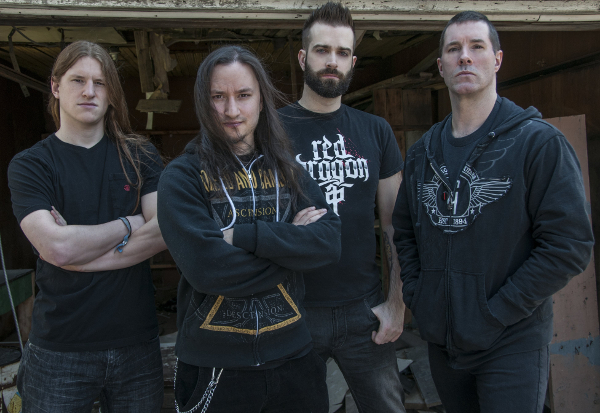
AO: I’ve always imagined you as the kind of guy who would drive and listen to McLaughlin, or Weather Report, or Jaco Pastorius in his car.
JW: Yep, Paco de Lucia! I was when I was younger, for sure! I definitely did. Friday Night in San Francisco, do you know that album?
AO: Of course.
JW: I can listen to that for days.
AO: I can stay in all day digging that record.
JW: I need to get it on CD, I don’t have that anymore. No, I did my eight-ten hours a day of no girlfriends, no partying, no friends, stayed in my parents’ basement in my room. My parents thought that I was nuts. And I would just sit there and I would tape things off our version of MTV which was called MuchMusic. Way back in 1980 or somewhere around then Van Halen, Judas Priest, Triumph, and Scorpions did a big festival in California called the US Festival, and I took that off the television, and I wore that VHS tape out just watching it over and over. And, actually, the one guy who could relate to that more than anybody I’ve ever met was Diamond Darrell before he was Dimebag.
AO: When he had big hair. [Laughter.]
JW: Yeah! The first tour they did in Europe, before Cowboys from Hell was released in Europe, we did it with them. We spent a couple of months on a tour bus with them touring with Judas Priest on Painkiller album in 1991. And I got to talk to him and he has almost identical birth date with me, same age. We are totally different in terms of culture. Where he lived in the US versus where I came from, and my upbringing, and where I live, we are completely different. But we totally came together on Van Halen. We came together on the same influences. He just went this way with it, and I went that way with it. But he understood totally. Him and Vinnie would sit down and watch Van Halen videos and Metallica videos when they were younger. And analyse everything. Why are they so good? Why? Why are their songs good? What are they doing? I did the same thing and we’ve all put in our practice time. But as soon as Pantera and Annihilator got going, it was party time and forget schooling and practicing, and let’s just get out there and have fun. So my schooling, and lessons, and learning, and all that was so long ago. I really haven’t learnt anything new for 15-20 years.
AO: But how do you maintain your technique? Does it require everyday practice?
JW: No. A lot of guitar players hate me because I can go for six months without touching a guitar sometimes. And then it’s time to write for an album, I get back in and slowly just to get muscle back. It takes about two weeks for me to get my fingers and my neck… For some reason the way I pick it’s a problem when I tense a part of my neck. And when I do a lot of work in the studio it’s actually a good thing that I take a lot of time off, because I’d probably damage myself beyond use. But the only time I pick up the guitar is to write riffs, to practice for tour, to practice of guitar clinics and to write songs. I haven’t touched a guitar since last week after the last show in South America, and I am going to be on this press trip for a few more weeks, and unless I have to, I won’t even touch a guitar. I got to a certain level where I’m comfortable saying, “Hey, I’ve got good enough stuff here to write songs and play solos.” Some guys just want to keep improving, and some guys just say, “That’s good enough. I want to go out and drive a sports car, or go swimming, or go on a vacation, or go on a tour and have fun, and do other things.” Imagine spending your life just practicing. It would be kinda crappy.
AO: Do you ever sit down and play for yourself? Not for practice, not for anybody else, but purely for your own enjoyment?
JW: Yeah. The only time I do… In my office I’ve got an Eddie Van Halen amp EVH 5153. It sits in my office. And every once in a while I’d grab a Van Halen replica guitar like Frankenstrat / Frankenstein, or a Kramer 1984 replica. And I’d just plug it in, grab the whammy bar, and just make some noise. But I’d say it’s once a month. I mean I do, I have fun. Or I’ll do a Scorpions song or something for fun. And then I’d put it down and back to business, and try to sort business stuff out. There is a lot of work to do as manager as well, and everything else. You spend a lot of time on the computer. So if you are not in the studio, you are on the computer. And if you are not on tour, you are on the computer doing something to keep the band running. So there is a lot of right-hand disaster.
AO: So what do you make of the changes in the record industry these days? The way stuff is distributed, the way fans are getting into music, free downloading, etc.?
JW: For new bands it’s amazing. Because you could be living in South Africa, or China, or wherever in the world, but as long as you have an Internet connection and you can make some music, you can have people hear it in minutes. From where I came from, I’d mail out cassettes to fanzines in 1986, and it would take three weeks to get to that country. Then they’d have to open it and hear it, and then put it in their little fanzine, and it would take a couple of months, and five months later or four month later you’d go to a mail box and you’d be reviewed. And with record companies you had to spend so much money to courier around your cassette tapes. Now you can upload it in ten seconds, send a link, somebody clicks on it, and here you go. So I think for new bands that’s the best possibility. For big bands with the Internet and stuff a lot of them make so much money they don’t really care. I think the Internet definitely hurts bands in the middle, especially metal bands that are not in the Slayer / Metallica… Well, Metallica is kind of different, they are in their own genre far beyond…
AO: In the stratosphere.
JW: Stratosphere for how well they do, obviously. But for Slayer-level bands – which there are not a lot of either – but for the certain mid-level guys like Testament, Overkill, Exodus, Annihilator, the Internet I think hurt us because we need every penny we can get from those record sales to help the record companies give us more advance so that we can make the records, go on tour, and try to just survive with this. But at the same time in North America I found when traditional metal went out in 1992 or whenever it did for the Pearl Jams and the Alice In Chains, it was kind of a sad time for a lot of us who were really into that kind of music. Because it really went out in North America. Unless you could handle Pantera, Sepultura, Biohazard, or the new Metallica, you were pretty well out of luck, unless Slayer and Motorhead came to town. Judas Priest went from arenas and stadiums in Canada to clubs and theatres.
Anyway, somewhere at some point when Blink-182 and those pop-punk kind of bands came out, I started noticing they were wearing Iron Maiden, and Judas Priest, and Motorhead t-shirts. I was, “What?!” But I noticed what I thought was happening in North America was that those young kids, 14 year-olds that were digging these bands were seeing that some 41 was promoting Iron Maiden a lot. An in the soloing they did they had some Iron Maiden-style solos. And I was like, “Well, I know they are being goofy in their videos and all that, but that’s pretty fucking cool that they are putting Iron Maiden stuff in there because that means they listen to Iron Maiden and that’s cool.” So think with the Internet a lot of these young fans would see those t-shirts and hear them in interviews, and would go, “Who’s Iron Maiden?” And then it’s starting to come back. I think a lot of North American kids are starting to go, “Oh, wow! Check out Slayer!” And then the big bands got their reunions and their big tours, and resurgence came back, and Maiden and Priest started playing bigger places in North America, and it started coming back. The cool thing for bands like Overkill, Testament, Exodus, and Annihilator-level bands is that we are finally getting the benefits of that resurgence. The big guys got their notice now, and now the other guys are getting their dues so to speak. We ARE getting our dues. We have never been away. Testament changed line-ups like we did, and Exodus did different singers, different line-ups, and they’ve never stopped. They never quit, they’ve never said, “Screw this,” and did a reunion 15 years later. They’ve never stopped. Even if they were starving or they were having hard times.
AO: Yes, I remember seeing them in tiny clubs.
JW: And can you imagine being Glenn Tipton in stadiums and the success they’ve had and then down to theaters.
AO: Same thing happened to Motley Crue, which is hard to believe these days. Motely Crue would play clubs at some point after all the phenomenal success they’ve had.
JW: Yeah. With John… What’s his name?
AO: Corabi.
JW: Who is actually a great singer / guitar player. But it was like… You know, us, mid-level bands… I just call it “mid-level bands.” We deserve it because we have been there the whole time. We have never had big, huge success like the bigger bands. Which is not necessarily what we deserved, or needed, or wanted, but there was a long struggle for the bands I’ve mentioned for a lot of years. And a lot of stress, and a lot of ups and downs. So I’m glad to see bands like Testament with all the touring they are doing, it’s like, “Alright, they’re back!”
AO: Oh, Skolnick deserves it.
JW: He is the perfect fit. As much as he has his jazz trio… I saw him last year, and I’ve been buddies with him for a while and stuff…
AO: He is a metalhead.
JW: He is not though! He’s not!
AO: Deep down?
JW: To me, when I see Testament, he’s the guy who sticks out as not being the metal guy. You know he’s the thinking man’s, jazzy, schooled, lesson-practicing guitar guy. That’s what made Testament great – that they had the thrash guys and then there was Alex Skolnick adding melody to thrash music.
AO: I am being told I have to wrap up, and I have one last question. And it’s a bit goofy. I hope you don’t mind.
JW: I’m goofy, so…
AO: If you could have an answer to any question in the universe, what would you ask?
JW: Why do some people have to be evil?
AO: Why do you think?
JW: I don’t know. Do you have the answer?
AO: No!
JW: Oh, I thought you had the answer! [Laughter.] I don’t know why I said that, but in general there are some nasty things going on in the world all the time, so why do people have to do it? I don’t know. That’s maybe a stupid question.
AO: No, that’s a profound question.
JW: Well, if you knew it, maybe you could try to fix it.
Official website: http://www.annihilatormetal.com/


